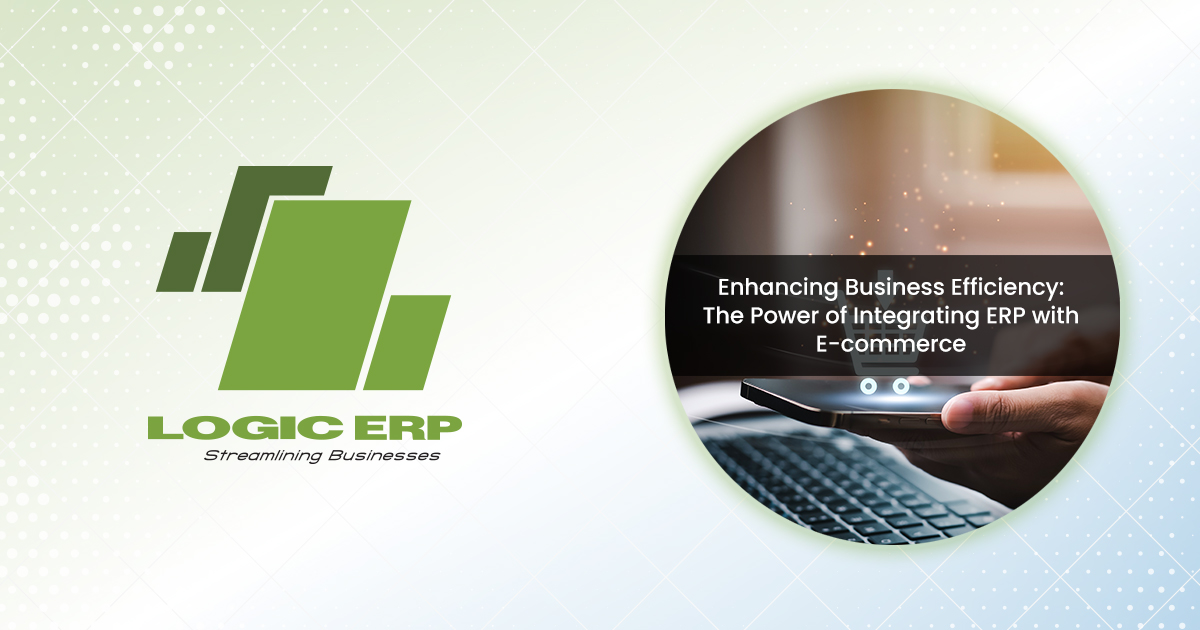

In today’s digital era, where e-commerce reigns supreme, businesses are constantly seeking innovative solutions to streamline operations, enhance customer experience and drive growth. One such solution that has gained significant traction is integrating Enterprise Resource Planning (ERP) systems with e-commerce platforms. This synergy between ERP and e-commerce holds immense potential for businesses, particularly in the retail and omnichannel sectors, offering a myriad of benefits that can catalyze success in a competitive landscape.
Understanding ERP and E-commerce Integration
First, let’s dissect the components involved. ERP software serves as a comprehensive solution for managing core business processes, including inventory management, order processing, accounting, human resources, and more. On the other hand, e-commerce platforms enable businesses to sell products or services online, reaching a global audience and facilitating transactions.
Integrating ERP with e-commerce essentially involves synchronizing data and processes between these two systems. It allows for seamless communication and real-time updates, ensuring consistency across various aspects of the business, from inventory management to customer relationship management (CRM).
Streamlining Operations and Improving Efficiency
One of the primary advantages of integrating ERP with e-commerce is the streamlining of operations. By centralizing data and processes, businesses can eliminate duplicate data entry, reduce manual errors, and automate repetitive tasks. For instance, when a customer places an order on the e-commerce platform, the integrated system can automatically update inventory levels, trigger order fulfillment processes, generate invoices, and update financial records in the ERP system—all without human intervention.
This automation not only saves time and resources but also enhances accuracy and efficiency, allowing businesses to focus on strategic initiatives rather than mundane administrative tasks. Whether it’s managing inventory across multiple channels, processing orders promptly, or analyzing sales data for informed decision-making, ERP and e-commerce integration empowers businesses to operate more smoothly and effectively.
Enhanced Visibility and Decision-Making
Another significant benefit of ERP and e-commerce integration is improved visibility into business operations. By consolidating data from various sources into a centralized dashboard or reporting system, decision-makers gain a holistic view of the entire supply chain, sales performance, customer behavior, and financial metrics in real time. This visibility enables proactive decision-making, as businesses can identify trends, anticipate demand, allocate resources efficiently, and respond promptly to changing market dynamics.
For instance, retailers can leverage integrated ERP and e-commerce data to optimize inventory levels, identify best-selling products, tailor marketing strategies based on customer preferences, and forecast demand accurately. Similarly, omnichannel retailers can ensure a seamless shopping experience across online and offline channels by synchronizing inventory, pricing, and promotions in real time, thereby maximizing sales opportunities and customer satisfaction.
Personalized Customer Experience
In today’s hyper-competitive retail landscape, delivering personalized experiences is paramount for fostering customer loyalty and driving repeat business. ERP and e-commerce integration play a pivotal role in achieving this goal by leveraging data insights to tailor offerings, promotions, and communications to individual customers’ preferences and behavior.
For instance, by analyzing purchase history, browsing patterns, and demographic information, businesses can segment customers into targeted groups and deliver personalized recommendations, discounts, and promotions via the e-commerce platform. Moreover, integrated ERP systems enable businesses to track customer interactions across multiple touchpoints, providing a unified view of the customer journey and facilitating personalized interactions at every stage.
Scalability and Adaptability
As businesses grow and evolve, scalability and adaptability become critical factors for sustained success. ERP and e-commerce integration offer scalable solutions that can accommodate growth and expansion seamlessly. Whether it’s adding new products, expanding into new markets, or integrating with third-party systems, an integrated ERP system provides the flexibility and agility to scale operations without disrupting existing workflows.
Moreover, as technology continues to evolve, businesses need systems that can adapt to changing requirements and incorporate emerging trends. With ERP and e-commerce integration, businesses can stay ahead of the curve by leveraging advanced analytics, artificial intelligence (AI), machine learning (ML), and other cutting-edge technologies to drive innovation, optimize processes, and deliver superior customer experiences.
Overcoming Challenges and Considerations
While the benefits of integrating ERP with e-commerce are undeniable, it’s essential to address potential challenges and considerations to ensure successful implementation. These may include:
-
Compatibility and Integration Complexity: Ensuring seamless integration between ERP and e-commerce platforms may require technical expertise and coordination between different stakeholders, including IT teams, vendors, and third-party providers.
-
Data Security and Compliance: Protecting sensitive customer data and ensuring compliance with data privacy regulations (e.g., GDPR, CCPA) is paramount. Businesses must implement robust security measures and data encryption protocols to safeguard against cyber threats and unauthorized access.
-
Cost and Resource Allocation: Implementing and maintaining integrated ERP and e-commerce systems may involve upfront costs, ongoing maintenance expenses, and resource allocation. Businesses should conduct a cost-benefit analysis and allocate resources judiciously to maximize ROI.
-
User Training and Change Management: Introducing new systems and processes may require comprehensive training and change management initiatives to ensure user adoption and minimize disruptions to daily operations.
Conclusion
In conclusion, integrating ERP with e-commerce presents a compelling opportunity for businesses to optimize operations, enhance customer experience, and drive growth. By streamlining processes, improving visibility, delivering personalized experiences, and fostering scalability, ERP and e-commerce integration empower businesses to thrive in today’s digital economy. While challenges may arise, strategic planning, collaboration, and a commitment to innovation can help businesses harness the full potential of this transformative synergy. Embracing ERP and e-commerce integration is not just a technological investment—it’s a strategic imperative for businesses looking to stay ahead of the curve and succeed in an increasingly competitive marketplace.

